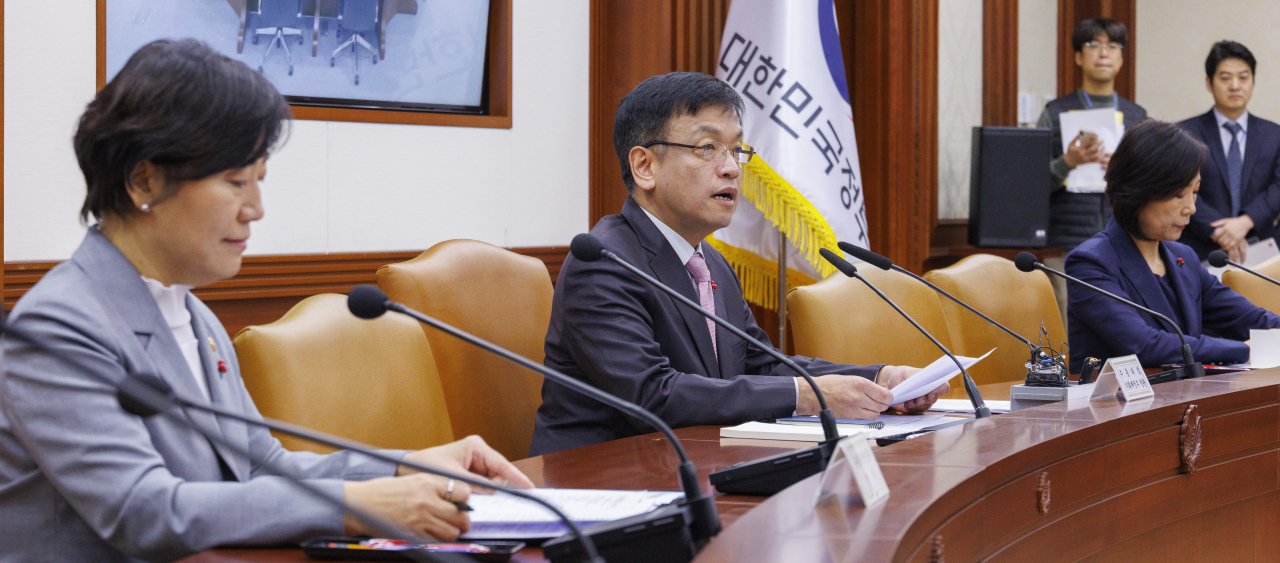Government vows more cash to cushion Taeyoung E&C fallout
By Hwang Joo-youngPublished : Dec. 29, 2023 - 18:01

The South Korean government said Friday that it will put utmost efforts into minimizing the fallout from Taeyoung Engineering and Construction's debt-restructuring program, amid growing concerns that it could lead to liquidity constraints across the industry.
“The creditors, led by the main lender, Korea Development Bank, plan to discuss ways to normalize Taeyoung E&C's business while adhering to strict restructuring principles based on Taeyoung Group's intense self-rescue efforts,” said Finance Minister Choi Sang-mok in a meeting with financial regulators Friday.
“The government will make every effort to minimize the impact on our economy and financial markets during the workout process.”
On Thursday, the country’s 16th-largest builder Taeyoung E&C, which has been suffering from a liquidity shortage due to real estate project financing loans, applied for a debt workout with its main lender, the state-owned KDB.
Choi said the government is preparing to expand market stabilization measures to prevent potential market volatility.
The measures would include adding more funds to a package of 85 trillion won ($65.5 billion) that the government rolled out last year to prop up credit markets in the aftermath of a debt default spurred by Gangwon Jungdo Development Corp.
Choi assessed that the impact of Taeyoung E&C’s workout will be limited, as the company’s financial exposure is just 0.09 percent of the total assets of financial institutions in the country, spread across multiple financial firms.
“The government will also encourage the financial sector to prepare for uncertainties,” Choi added.
As of September, Taeyoung E&C had 22 ongoing residential housing projects encompassing 19,869 living units. At these sites, the government will support tenants to move in by allowing Taeyoung E&C to continue construction or ensure that they get their contract payments refunded via the state-owned housing finance company, Korea Housing and Urban Guarantee.
The 581 contractors for Taeyoung E&C will also be eligible for compensation claims. In particular, those contractors whose sales depend more than 30 percent on Taeyoung E&C will be prioritized for receiving financial support, including loan extensions and tax cuts.
On the same day, the Financial Supervisory Service said it advised the financial sector to refrain from withdrawing funds during Taeyoung E&C’s workout process in a separate meeting with executives from major financial institutions.
There have been growing concerns that Taeyoung E&C's debt workout could prompt financial institutions to withdraw investments linked to project financing that could lead loans in real estate to turn sour en masse.
According to the FSS' announcement on Friday, it asked the financial sector not to levy disadvantages, such as reducing the amount for loans or increasing required collateral, on Taeyoung E&C’s suppliers.
In addition, those banking companies that provide financial support to Taeyoung E&C’s suppliers will be exempted from liability for insolvency unless they are intentionally negligent.
As of Friday, Taeyoung E&C has secured more than 1 trillion won in cash by selling off assets that include the company’s logistics wing Taeyoung Industry and taking collateral loans against golf courses it owns.
More discussions are expected with creditors on sales of other lucrative assets, such as its stake in terrestrial broadcaster SBS.
As of the end of September, Taeyoung E&C’s debts were estimated at 1.9 trillion won with a debt-equity ratio of 479 percent.
Taeyoung E&C has agreed to pay back commercial bonds worth 148.5 billion won maturing Friday.



















